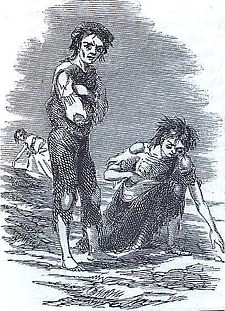- Skibbereen (song)
-
Skibbereen, also known as Dear Old Skibbereen, is an Irish folk song, in the form of a dialogue wherein a father tells his son about the Irish famine, being evicted from their home, and the need to flee as a result of the Young Ireland rebellion of 1848.[1]
Contents
History
The first known publication of the song was in a 19th-century publication, The Irish Singer's Own Book (Noonan, Boston, 1880), where the song was attributed to Patrick Carpenter, a poet and native of Skibbereen.[2] It was published in 1915 by Herbert Hughes who wrote that it had been collected in County Tyrone, and that it was a traditional song.[3] It was recorded by John Avery Lomax from Irish immigrants in Michigan in the 1930s.
The son in the song asks his father why he left the village of Skibbereen, in County Cork, Ireland, to live in another country, to which the father tells him of the hardship he faced in his homeland. It ends on a vengeful note expressed by the son.
Lyrics
- O, father dear I oftimes hear you speak of Erin's Isle
- Her lofty scenes, her valleys green, her mountains rude and wild
- They say it is a lovely land wherein a prince might dwell
- So why did you abandon it, the reason to me tell
- My son, I loved my native land with energy and pride
- Till a blight came over all my crops and my sheep and cattle died
- The rents and taxes were to pay and I could not them redeem
- And that's the cruel reason why I left old Skibbereen
- 'Tis well I do remember that bleak November (/December) day
- When the bailiff and the landlord came to drive us all away
- They set the roof on fire with their cursed English spleen
- And that's another reason why I left old Skibbereen
- Your mother, too, God rest her soul, lay on the snowy ground
- She fainted in her anguishing seeing the desolation round
- She never rose, but passed away from life to immortal dreams
- And that's another reason why I left old Skibbereen
- Then sadly I recall the days of gloomy forty-eight.
- I rose in vengeance with the boys to battle again' fate.
- We were hunted through the mountains as traitors to the queen,
- And that, my boy, is the reason why I left old Skibbereen.
- Oh you were only two years old and feeble was your frame
- I could not leave you with my friends for you bore your father's name
- So I wrapped you in my cóta mór at the dead of night unseen
- And I heaved a sigh and I said goodbye to dear old Skibbereen
- well father dear, the day will come when on vengeance we will call
- And Irishmen both stout and tall will rally unto the call
- I'll be the man to lead the van beneath the flag of green
- And loud and high we'll raise the cry, "Revenge for Skibbereen!"
Recordings
The song has been performed live and recorded by the Dubliners, Wolfe Tones and Sinéad O'Connor, as well as by many other contemporary Irish artists, and Vin Garbutt, an English folk singer of Irish descent. It has also been recorded by Frank Harte, on his recording "The Hungry Voice," a collection of songs about the Famine.
- Four to the Bar on their 1995 album Another Son.
- Irish Stew of Sindidun on their 2005 album So Many Words...
References
- ^ Skibbereen. URL accessed 13 January 2007.
- ^ The Poets of Ireland, ed. D.J. O'Donoghue. Dublin: Hodges, Figgis & Co., 1912
- ^ Herbert Hughes, Irish Country Songs, 1915
Categories:- Ballads
- Irish folk songs
Wikimedia Foundation. 2010.

